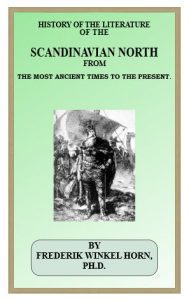THE Scandinavian nations constitute together a branch that in early times became detached from the great folk-tree which we usually call the Gothic-Germanic (or Teutonic) race. This branch embraces the inhabitants of Denmark, Norway, Sweden, and Iceland. The latter belongs, though merely in a political sense, to Denmark. In the following review of the intellectual life of these nations, as it has, in the course of time, found expression in literature, we propose to consider the inhabitants of the four countries named collectively, although they at the present
time, not only in politics, but also in many other respects, possess strongly marked national individualities, and differ one from the other in many things. We feel justified in so doing for the reason that they, in spite of differences, and in spite of all the feuds and conflicts that have divided them in the past, still in reality constitute a unity, which, quite unlike the other European peoples, even those which are most nearly related to one another, has acquired to the close observer a common physiognomy.
They are sister-nations, which, with the changes that time has wrought, have in some respects been developed each in her own peculiar manner. They have frequently met as foes, but in spite of this, they have preserved the mark of kinship, that became their common inheritance when they separated from the great race whence they sprang, to shift for themselves. In all essential respects they have given the world an intellectual product differing from all others, both in character and form, though of course continually influenced by the other streams of European culture. The fact that the northern peoples, from an intellectual standpoint, formed a national unity, that they were imbued and influenced by one and the same national spirit, was never for a moment lost sight of by the ancient inhabitants of the North; later it was somewhat obscured, though it was never utterly forgotten; and in our time the Scandinavian peoples have again become thoroughly conscious of their intimate kinship. ” The age of sundering is past,” said one of Sweden’s greatest poets half a century ago, and in spite of the political separation, the sentiment that ” we are one people, Scandinavians we are called,” as a Danish poet has sung, has during the past fifty years been growing continually stronger.
